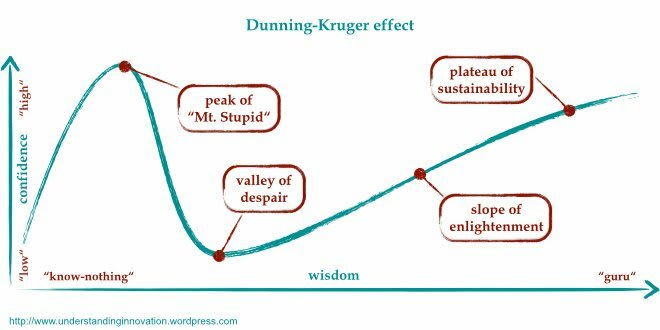We've made it to double figures folks. And on this momentous day I really ought to remind myself of the Dunning-Kruger effect:

Yesterday I was unknowingly tumbling into the so-called valley of despair. And having gotten even deeper into the valley today, I must admit - I do miss those days of peak stupidity. I was, in fact, so stupid as to believe that a 3 hour YouTube video could teach my all I need to start a full-blown project in Rust.
You may ask why I've had such a change of heart in 2 days. Well the answer lies in my feature branch for my time-rs project. This was the painstaking product of tonight's work. I feel like a language learner who wants to tell a funny anecdote but can barely muster a sentence about what I bought in the supermarket today.
Let's list out my open questions for today and summarize what was learned and achieved below.
Today's open questions
- How do I set up the Rust debugger in VS Code?
- Shoud I focus on reading more Rust code before attempting to do my own project?
- Does it make sense to simply follow a CLI tutorial rather than trying to design my own system (PROBABLY)
- What are
doctests? - Why would a unit test need to return something?
- Can I assign the result of match statement to variable?
TDD in Rust
I'm a big fan of TDD. Integrating testing into your workflow early helps you spot design issues and bugs not caught by the compiler (because sadly it can't check your if/else statements). Naturally I began my project by writing the tests first. This lead my to some interesting learnings:
- Store your unit tests in the same file as your features
- Dedicate a tests folder for integration tests
- Unit tests should be declared as a
mod, wrapped by a#[cfg(test)]decorator - Each test should have a
#[test]decorator - Use any of the assertion macros for testing outputs
- Use the
#[should_panic(msg)]decorator to test error handling - Run
cargo testto run your suite
To .expect or not to .expect
One of the first thoughts I had while coding was: how and where do I handle my Result? I've seen the Ok keyword and the .expect method. So which do I pick? Now often consistent code is good, but right now I'm just writing a function so there is consistency to work with.
The Rust docs advise against using .expect, but I can see cases where handling a Result upstream may just add unnecessary function nesting. As far as I can tell, using match is the given way of handling a Result. As match introduces new scope, you can can't access the variables inside the statement afterwards. But wait: can I assign the result of match statement to a variable like I can in an if/else statement (this isn't rhetorical, it came to me right now!!).
Scoping hurts your ego
Python and JavaScript barely care about variable scope. This allows you as the developer to declare this and that and access it in a triple nested if statement in a for loop if you so please. Rust ain't like that. Opening an if/else makes me nervous and unsure about which values I'll be consuming upstream. Right now I've barely even written more than a few functions, but I can see how system design and memory management becomes more challenging once you're managing data at higher and lower levels in your program. Until I get used to this way of thinking, I'm going to have to get used to the pain of scoping.



Top comments (0)